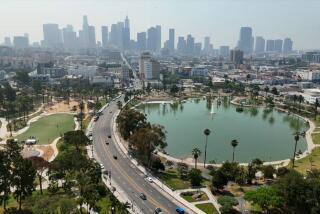Carpool Lanes Built, but Will They Be Used?
- Share via
Only Southern California would mark the opening of congestion-clearing carpool lanes with a traffic-stopping parade of classic cars.
That is precisely what transportation officials did Thursday to celebrate the long-awaited closure of a six-mile gap in the San Diego Freeway carpool lanes between the Harbor and Long Beach freeways, creating the longest stretch of continuous carpool lanes in Southern California--59.5 miles, from Los Angeles International Airport to San Juan Capistrano.
Until Thursday, the longest continuous carpool lane was a 50-mile stretch that opened last year, going from California 57 in Diamond Bar to Interstate 5 in Orange County to San Juan Capistrano.
Now--this being Southern California--one question remains: Will drivers use the lanes?
Only about 14.5% of Southern Californians commute by carpool--a percentage that has remained virtually unchanged over the years despite a multibillion-dollar program to add carpool lanes to freeways. Even with offers of $2 a day in gift certificates for every day of carpooling and guaranteed taxi rides home in emergencies, it’s hard to break solo commuters of their drive-alone habit.
Caltrans officials consider the carpool lanes a success, noting that Southern California at least has held its own while carpooling nationwide has declined. They say the benefits will become more apparent as gaps in the high-occupancy vehicle lane system are completed.
“As we bring these pieces together, people are going to be more likely to rideshare,” Tony Harris, Caltrans’ director for Los Angeles and Ventura counties, said at Thursday’s ceremony in Carson.
The carpool lanes that were opened Thursday--six miles in each direction--cost $28 million, took three years to build and were funded by the Metropolitan Transportation Authority, largely from Los Angeles County’s penny-on-the-dollar transit sales tax. The lanes are expected to save carpoolers an average of 6 minutes on their trip during rush hour. The lanes also help solo commuters, officials say, because they draw cars out of the regular traffic lanes.
Carpoolers were delighted.
“It was great,” Richard Davidson, a civil engineer from Huntington Beach who vanpools with six co-workers to their jobs at Los Angeles International Airport, said about his morning drive in the new lane.
Traffic has been so bad on the southbound San Diego Freeway during the evening commute that he and his colleagues often take a roundabout way home--traveling Interstate 105 to the 110 to the 91 to the 605 to the 405. “Tonight, we’re going to go the straight route,” he said.
John Dunwoody, a senior scientist from Long Beach who carpools to Hughes Space and Communications in El Segundo, said his morning commute has been reduced from 50 minutes to 35 as segments of carpool lanes have opened up. “I’m very happy that it’s open,” he said.
Absent from the celebration was Assemblyman Tom McClintock (R-Northridge), a critic of carpool lanes who suggested, “One crew with a sandblaster could open up enormous additional capacity on these freeway lanes simply by removing the hated diamond.” He plans to reintroduce state legislation to study whether carpool lanes actually work.
Caltrans engineers say that if they opened carpool lanes to general traffic, they would fill up rapidly and reach the same gridlock conditions as other traffic lanes.
Dawn Helou, a Caltrans senior engineer who oversees high-occupancy vehicle operations in Los Angeles and Ventura counties, said the raw number of carpoolers is increasing. “Look at how many driver’s licenses we’re passing out every day,” she said. “To maintain a 14% carpooling rate out of the number of driver’s licenses we hand out everyday is a real success story.”
Some places are considering dismantling their underused carpool lanes. But C. Kenneth Orski, president of Urban Mobility Corp., a transportation consulting firm in Washington, D.C., said, “Generally speaking, the HOV lanes in Southern California have been among the more heavily utilized lanes in the nation.”
Indeed, some carpool lanes are reaching capacity during rush hour, and traffic engineers have talked about raising carpool lane requirements from two to three occupants per car.
But if the rules change, they fear something they call “empty lane syndrome,” with too few carpoolers. They also fear that evicting two-person carpools would worsen traffic congestion in other lanes. Even worse, they fear a public backlash--the kind from the disastrous Santa Monica Freeway diamond lane experiment of the 1970s, when they faced a public revolt after taking away a traffic lane and converting it to a carpool lane. Since then, the policy has been never to take away anything; they add lanes for carpools.
Traffic planners are also studying the option of opening up underused carpool lanes to solo commuters willing to pay a toll. But that, too, is politically controversial.
Since the first high-occupancy vehicle, or diamond lane, opened on the San Bernardino Freeway 25 years ago, more than 300 miles of carpool lanes have been built in the Los Angeles region, more than in any other place. That number is expected to grow to 680 miles by 2010.
“The purpose of the HOV program is to reduce congestion by using the capacity of the freeway system more efficiently,” said a recent Caltrans report. “We cannot build our way out of future growth and congestion by simply adding more and more lanes.”
Still, there even was official appreciation of what’s been done so far: “The only place I can’t get an HOV lane is to Catalina [Island],” County Supervisor Don Knabe quipped at Thursday’s opening ceremony.
(BEGIN TEXT OF INFOBOX / INFOGRAPHIC)
Carpool Connection
Carpool lanes on the San Diego Freeway between the Harbor and Long Beach freeways opened Thursday, creating the longest continuous stretch of high-occupancy vehicle lanes in Southern California--59.5 miles from Los Angeles International Airport to San Juan Capistrano.
More to Read
Sign up for Essential California
The most important California stories and recommendations in your inbox every morning.
You may occasionally receive promotional content from the Los Angeles Times.














